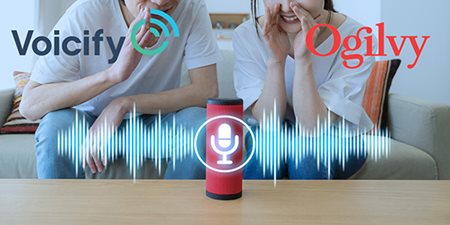Voicify Discusses Ogilvy Partnership & Future of Voice
Without question, if you aren’t already thinking about voice technology for your brand, you should be. Ogilvy, a digital marketing agency founded in 1948 by David Ogilvy, already has. News that Ogilvy has partnered with Voicify, a voice experience platform, was announced this past week.

"In a world where consumers' demands are ever-changing, it is essential for brands to seamlessly engage with their customers, no matter the medium.", said Ben Levine, Global Lead and Partnerships at Ogilvy. He adds: "We are thrilled to partner with Voicify to provide innovative voice solutions that create a personalized experience that creates meaningful engagement between our clients and their customers."
I was lucky enough to connect with Robert Naughton, Chief Revenue Officer at Voicify, to hear his thoughts on the partnership. “Ogilvy is one of the preeminent advertising agencies around the globe. They are constantly looking for ways to leverage the intersection of emerging technology and creative for their clients. Many of our prospect clients will want to use Ogilvy to handle all aspects of their voice application, inclusive of Strategy, UX, Creative, and Technology while benefiting from the Voicify platform.”
To hear more about the future of voice, and how brands can create a powerful voice experience, read the rest of our conversation below!
The Future of Voice
If you don’t think voice is trending, or already here, then take this statistic from Business Insider. Amazon is expected to sell 113 million total Echo devices over the next four years, with 1.3 million units sold in 2020 alone. That will bring in roughly $4 billion in device revenue for just that year.
As more brands look to voice technology, I asked Robert what the most important benchmarks brands should be thinking about as they prepare for the future of voice, and why they shouldn’t risk falling behind or missing out on the voice “revolution”. “By 2022, approximately, 50% of all consumer searches will be done via voice assistants. In addition, commerce through these assistants will increase by 20x to 40BB. Brands and organizations cannot ignore the hyper-growth of this emerging channel and will realize that, with Voicify, other companies can easily create and deploy voice applications that will compete for their market share.", says Robert.
With that said, many industry authorities (such as Google, Forrester, etc.) predict that as many as 75% of U.S. homes will have a smart speaker by 2020. 44% of those people, at least once a week, are most likely using their voice-activated speaker to order products such as groceries and other household items. Also, globally speaking, smart speaker shipments grew nearly 200% YOY in Q3 2018 according to Strategy Analytics. This led to my next question, asking Robert where he sees voice heading based on the predictions above.
“Voice will follow a similar arc to other emerging technologies. Initially, brands will use their voice applications for education and general support of their consumer base. Once trust has been established, organizations will begin to promote personalization, account linking, and other client-retention efforts. Finally, consumers will view these voice applications as the de facto channel and will begin transacting. For more progressive brands, they are tackling the entire maturity curve at the same time.”, said Robert.
Creating a Powerful Voice Experience
As more companies experiment with voice assistants like Amazon Alexa and Google Home—just to name a few—it is easy to conceive that those customers will expect more brand control in their experience. A good first step in developing a voice-first strategy is to consider what your brand is all about. Are you geared toward customers of a certain age or gender? Are you a luxury brand, or a technical B2B, or B2C brand?
I wanted to know how brands can wrap their head around creating a powerful voice experience without it becoming such a daunting task and deterring from it. “Brands need to work with their agency partners to determine where a voice application fits into their overall customer journey map and digital strategy. It’s an entirely new area of conversational expertise and user experience. Initially, it can be daunting for a brand to consider creating unique experiences for each assistant. However, Voicify has removed that barrier.
In a nutshell, Voicify is an SaaS platform that allows brands to create a voice application (s) on the platform and then deploy out to Google, Cortana, Alexa, Chatbots, Bixby, etc. in a 'create once, deploy to many' approach without having to create unique applications for each voice assistant. We then enable brands to easily manage the voice applications using the content management features within the platform. This solves a massive scalability and cost issue for companies.", said Robert.
Ending Notes
Have you spoken to, or sent a command to a technology device lately? Voice-enabled devices are becoming more prominent in our everyday lives. 65% of 25–49-year-olds speak to their voice-enabled devices at least once per day.
For organizations to fully understand and capitalize on this type of technology, there are many things that need to be thought out before considering a voice application. Jeff McMahon, CEO at Voicify, sat down with us at Sitecore Symposium 2018 to explain how this might look: “With the Voicify platform, what you really want to do is figure out how your customers, specifically your demographic of customers, is using voice.”, and added, “Then you’re tailoring an experience to that.”
If you have any questions, or are interested in Voicify’s platform and their offerings, let’s start a conversation!

Gabriella Pirrone
Gabriella is the Digital Marketing Assistant for CMSC Media. She brings a wealth of knowledge from not only a CMS perspective but also content, SEO and eCommerce. She enjoys everything social media and staying ontop of the latest trends in the digital marketing world.